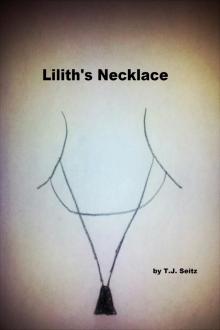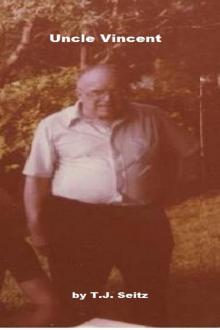Louisiana Rain Read online
Louisiana Rain
T.J. Seitz
Copyright 2012 by T.J. Seitz
Introduction
This story is a creative combination of recent, distant and imagined memory.
I believe that recent memory relies heavily on details to sustain itself and that distant memory is generated by embracing the spirit of pervious experiences. Imagined memories are created within the gray regions that exist somewhere between the past and present.
I began writing this story when I was a stereotypical undergraduate English major. I had long hair, a black leather jacket and a worthless chip on my shoulder. Despite my poetic aspirations I was essentially clueless when it came to expressing my thoughts effectively in writing.
What I wrote was ordinary or incomplete. It usually read like a contract or computer manual. I failed to understand that I also needed to develop those ideas; bringing them to life by creating an enchanted connection between the reader and the words I wrote.
After finishing an initial draft for a creative writing class, I lost track of the work during the next decade because life got in the way. Marriage, kids, jobs, grad school and a divorce distracted me from pursuing many of my interests.
Eventually the crazy making ceased and balance returned, allowing me to remember forgotten parts of myself with the benefit of hindsight and temperance. I began re-reading novels from my dusty bookshelves and writing prose again with a different perspective.
I recalled the piece after reading a magazine article about the aftereffects of Hurricane Katrina but could not find it in any of my files. I attempted to rewrite the essay from memory then impulsively contacted an old girlfriend from college, whom I happened to share an electronic version with, after finding her old e-mail address in a paperback copy of Still Life with Woodpecker.
Nikki never forgot or threw anything away, including our unresolved relationship, which I ended abruptly soon after meeting my now ex-wife.
It had been several years since I had slept with a woman so I was looking for any opportunity to get laid. She was currently living in Boston with her two daughters. My employer has an office on Bedford Street. I attend company meetings there every other month or so.
We met at her place, talked some, had dinner with her kids before sending them off to friend’s house for the night then fucked each other’s brains out; quickly crocheting the loose ends we left behind in college, before she gave me a photocopy of my story.
While lying in bed together, she informed me that she recently broke off a long term relationship with the father of her youngest child. I asked her who the father of her older girl was. She answered my question frankly and told me that I was the father.
But that’s another story.
It was interesting to see how the two versions of the same story differed. The language was more flowing and expressive in the rewritten version because my writing style had matured but I had obviously forgotten a lot of the details over the years that were in my original account. I needed to think about and re-remember what happened.
Melding the two pieces into a third wholly new story relied on different kinds of memory to succeed.
Memory can play tricks on you, especially when it’s not recorded or documented constantly. Imagined memory thrives on vagueness and will gradually replace factual details with fabricated ones as long as they don’t conflict with the feelings associated with a person’s distant memory. Feelings are subjective and can change with time thus allowing everything experienced to blend together and get mixed up, allowing an individual to perceive truth and fantasy as one in the same.
The classic example of a couple breaking up is a great way to articulate the differences between recent, distant and imagined memory. Immediately after a pair goes their separate ways each experiences the raw details and freshly hurt feelings of their separation. The emotions and particulars, be they positive, negative, unbiased or discriminating, are right there in their faces to acknowledge, deny, sort through, embrace and experience. Recent memory is usually pretty easy for a person to describe, ponder and relate to in a much more personal, tangible manner. Recent memory is vivid and driven by instinct and the moment. What we remember can be or is broken down into obvious facts that we organize in our heads to share with ourselves and others. Doing so helps with coping so that we can do things like blame, feel justified or just prepare ourselves to eventually accept or take responsibility for our part in what happened.
Over time though, people naturally become detached from their experiences and generally move on with their lives, distant and imagined memory merge and become active.
The spirit of an experience eventually takes over, unconsciously replacing specific details with impressions that sustain a transparent vagueness blurring the line between fact and feeling (imagined memory).
Distant and imagined memories are more powerful than recent memory in the long run. However they both depend on recent memory initially to set their foundations so that over time as the connection between past and present fades and the end results overshadows or overpowers the truth.
Imagined memory selectively censors and/or edits the truth while distant memory sustains the results.
Distant memory’s source of existence is created similar to a habit by thinking about something over and over again inadvertently fabricating things like obsessions or in a positive sense helping a person truly realize their weaknesses, taking responsibility for their choices through authentic contemplation over time.
As years blend together, distant memory can fuel denial or ignorance, masking the true nature of what actually happened. Misleading someone into believe in a fantasy such as that love does or did still exists..
The timeless battle between idealistic and realistic takes place amongst the three memories. They can cause someone to become sentimental and reminisce or romanticize too much about their lost love creating a fantasy relationship and associated feelings in their head over an extended period of time that never existed yet is still feels real none the less (because many of the specific details became lost or forgotten…..(I believe that aporia is a Latin word for a forgotten memory)….from their memory over time after they moved on).
They can also work in the opposite direction through anger, wrongfully making a relationship out to be much worse than it really was overall by allowing a person to obsess over all the bad parts, exaggerating or elaborating them more to wrongly represent the whole experience as bad when in reality it just ran it course.

 Expect It When You Least Expect It
Expect It When You Least Expect It Louisiana Rain
Louisiana Rain Three Degrees of Passion
Three Degrees of Passion Lilith's Necklace
Lilith's Necklace The Once and Future Thug
The Once and Future Thug Uncle Vincent
Uncle Vincent A Fairy Tale Contract
A Fairy Tale Contract